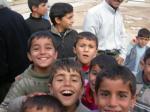
Summary: I've enjoyed performing the patrolling mission here in Iraq. My favorite thing to do was visit the villages and hand out toys and school supplies to the children. But now we're switching to the Field Artillery mission. I did my best to communicate with the children in Arabic, and sometimes we even understood each other. I tried to soak it all in the last time I went to the village, knowing I might not make it back, if ever, for a long time. I'd like to bring my family back someday to see what it's like.
We recently received a change of mission. Rather than going out on patrols now, we are doing what we were originally trained to do--the Field Artillery--some of us preparing to use our cannon skills for over 20 years.
But this means that I won't be going into the village anymore.
A couple of days ago I realized that my visit to the village would be my last, and I therefore took the experience in a little bit more keenly. Yes, the kids were sometimes mean to each other as they clamored for the best toys or notebooks, but I've seen similar competition as candy gets tossed from a float in an American parade. All in all, they are good, handsome children, who I hope grow up with a much better chance than their parents and grandparents at living life the way it can and should be lived.
What I liked most about the patrol mission and visits to the villages is that the exposure of the younger generation of Iraqis to American soldiers will create a positive image in their minds of America, especially because they know we like them and try to serve and just be nice to them.
Although a greater number of Iraqi adults seem to be at least cordial with us than when we first arrived, it is far more likely that children will wave and be friendly to us than adults. But when they are in the same car as their parents for example, the children's exuberance at seeing the American troops seems to carry over with their parents, who in these circumstances more often smile and wave as well.
On my last visit, some of the kids in the village spoke some of the English to me that they are just beginning to learn in their school. And because we took a little more time handing out the toys and school supplies, I was able to speak a lot more Arabic to them than I had at any other time, which they thought was great. I shook their hands and gave them high fives and we did the thumbs up sign to each other. It was great to see the smiles on their faces as I left wondering if maybe 10 years from now I could bring my family back to that village in more peaceful and secure circumstances.
I pray that it may be possible then, if not sooner.

